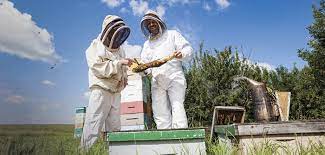Manuka Honey is positioned for recovery despite recent climatic setbacks and continuing concerns over copycat competitors.
Manuka honey was being hailed as the new hort gold only a couple of years ago. Established and newly minted beekeepers were scrambling to secure hives, equipment and markets for the precious product, which was achieving prices as high as $80 a kg in its purest form.
The 2017 Apiculture NZ conference had the feel of a Mystery Creek Fieldays, with equipment retailers spruiking trucks, handling equipment and hive options, while more than 1000 delegates queued for what was once a low-key, small venue event.
But a couple of tough Springs hit the flowering rates hard for the increasingly valuable Manuka bush. Total honey volumes produced in 2017 dropped from 19,885t the year before to 14,855t, with Manuka volumes hit particularly hard in parts of Northland, Bay of Plenty and East Coast, due to a poor Spring limiting plants’ early flowering ability.
The fortunes of NZX-listed honey giant Comvita are an accurate barometer for the weather’s impact upon the sector in the past two years, and the challenges that still lie ahead for one of the country’s most rapidly emerging export sectors.
It has been a bumpy ride for Paengaroa-based Comvita, which was the darling of the sharemarket two years ago, reaching the dizzying heights of $11.50 a share in September 2016.
But the record poor harvest that had the company only achieve 40 percent of its expected North Island Manuka volume resulted in Comvita’s share price going into freefall that Summer. The year-end loss of $5.5 million pushed its share price to an all-time low of $5.20 by July last year.
Comvita’s share priced recovered to $9 by early this year, but was again knocked by an announcement the harvest was again poorer than initially expected, and profits were pushed back to $8.2 million, only half what had been initially expected.
But Comvita chief executive Scott Coulter is upbeat about the sector’s prospects, and says he appreciates that being the only publicly floated company in the sector means he’s in the spotlight more than most.
“Historically we have not had three bad seasons in a row for Manuka, and early indications are this Spring is looking more typical, and we are due a good one,” he said.
The company has been working hard to buffer against the surges in Manuka honey supply that result from seasonal variation, including buying up $89 million of honey stock.
Work is also continuing in trialling different Manuka varieties that flower at different times, particularly in the lower North Island.
“That way if you do get a bad weather event, you have your risk spread and will not lose out entirely if there are later flowering varieties still to come.”
“Historically we have not had three bad seasons in a row for Manuka, and early indications are this Spring is looking more typical, and we are due a good one.” – Scott Coulter
However, having the good stockpile of Manuka on hand also means prices have not spiked upwards as much as might have been expected after another tough season.
On the demand side, Coulter said markets were still strong, with good growth being reported in the US, as well as the company’s biggest market, China.
US sales have grown to $26 million of the company’s $186 million turnover, while China makes up $46 million. UK sales have also recently surged, with a reported 17 percent lift over the past year to almost $9 million.
He attributes the success in China to the hard grind of forming a strong early relationship with their local distributor, who ultimately became Comvita’s joint venture partner.
“You do have to invest the time in these relationships and keep up the contact regularly.”
A couple of recent attempts by investors to buy Comvita have not come to pass. But Coulter said the due diligence processes that had been conducted had helped the company define more closely where it was heading.
“We could see we were doing well in China and had started to do well in the US,” he said. “The only way you can manage both opportunities is to really focus resources to make both work.”
The work on trials to build the supply of Manuka plantation has also gained greater traction, and is giving the company more confidence about its supply chain’s continuity.
Wendy Mossop of Mossop’s Honey has mixed feelings about prospects for the honey sector over the coming months. She, like everyone else, has had her fingers crossed for a better Spring-Summer harvest than the previous two years.
However, she said that for once the weather may be the least of the sector’s problems.
“We are seeing quite a few battles going on out in the industry at present,” she said.
“We have the Australians fighting for the right to use the Manuka honey brand, and that’s affecting values, and there is the threat of China coming into the market in coming years with Manuka honey from cuttings grown there.”
Meantime uncertainty continues to exist around MPI’s honey standards as officials try to fine-tune the science that is causing some headaches in standards’ interpretations. (see accompanying story Protecting Manuka honey purity.)
She said for smaller operators who have been drawn into the market by the prospects of big returns from Manuka honey, the past season has proven devastating, and prospects are not overly positive for them.
“They are struggling to sell their Manuka because everyone [now]has plenty of honey on hand, and prices are well down on what they need them to be. They will be struggling to feed their hives going into a new season, and it will be very hard for them to see a profit from this.”
There have been a number of smaller operators selling out their hives and in some cases having to walk away from their operations, she said.
“Some of the issues there are to deal with, require more than just a good Spring.”
Apiculture NZ chief executive Karin Kos said attendance at this year’s Apiculture conference did not reflect any loss of confidence in the sector, despite a couple of tough years.
“We are of course hoping for a good season this year and the longer-term confidence in the industry is still good,” she said.
“We continue to see strong market growth and having the MPI standards has helped reassure our markets.”


















